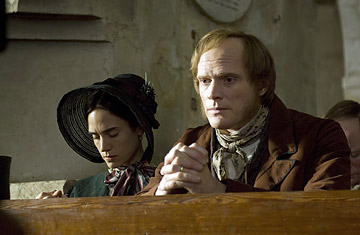
Jennifer Connelly and Paul Bettany in Creation
At the beginning of Creation, we're promised the movie will reveal how Charles Darwin came to write The Origin of Species. Unfortunately, we don't get to set sail on The Beagle, but in a literal sense the movie does deliver, in that we do get to see Darwin (Paul Bettany) repeatedly sit down at his desk and move a pen across paper. Eventually, we see him drop a fat parcel in the back of a horse-drawn wagon, sending his Origin manuscript off to his publisher.
All this is just as exciting as it sounds, but director Jon Amiel's main intent is to frame Darwin's authorship of one of the most important books of all time around the death of a child, Darwin's 10-year-old daughter Annie (Martha West). Between her loss and his grief, Creation is a doubleheader of misery and melancholy that serve mostly to make you look forward to the writing bits. After a bout of scarlet fever, Annie languished for weeks. She was apparently the light of Darwin's life, and the movie does not miss an opportunity to point out her charms. She does cartwheels on the beach, brings Darwin bugs to identify, begs him to tell her that story about the cute orangutan again and again and, in her appearances as a ghost, offers helpful writing tips like "What are you so worried about? It's only a theory."
Creation is based on a book called Annie's Box (published in the U.S. as Darwin, His Daughter and Human Evolution), written by one of Darwin's descendants, Randal Keynes, and inspired by a box of keepsakes from Annie's short life, items carefully set aside by her parents, which Keynes found in the family archives. Darwin and his wife Emma (played by Jennifer Connelly, Bettany's offscreen wife) had 10 children in all. Several of them are featured in the film, though you'd be hard-pressed to identify them as anything beyond Neglected Son No. 1, Neglected Son No. 2 and the Other Daughter. The movie implies that Annie's death made it possible, in an odd way, for Darwin to write the book, his faith in God having been so jeopardized by the unfairness of her death. (Annie died in 1851; Origin was published in 1859.)
Otherwise, we're led to believe, he might have kept his inflammatory theories about evolution to himself. For one thing, they upset the deeply religious Emma, portrayed by a painfully stick-thin Connelly as a woman of humorless severity. But he's continually pushed to write the book. His friend and advocate, biologist Thomas Huxley (Toby Jones), drops by Darwin's country home to needle him to get cracking on that book. Huxley crows, "You have killed God, sir!" in much the same way the good people of J.K. Rowling's books compliment Harry Potter on thwarting He Who Shall Not Be Named. Darwin looks pained and disinterested, as if he'd like to pass on the world changing and just spend a quiet hour in the bathroom by himself (he had chronic stomach troubles). It's only after he examines his grief for Annie under a microscope that he's able to get over his writer's block.
This interweaving of science and real life sounds suspiciously like a Hollywood plot to humanize that old guy with the long gray beard. There's nothing inherently wrong with that. After all, who doesn't want to know more about the softer side of the man still causing a ruckus at school-board meetings across the land more than a century after his death? But the movie has an appalling narrative structure. We meet the little girl, admire her ready smile and, as the time frames shift, quickly realize she's doomed. (First clue: excessive cuteness. Second clue: Other Daughter's pointing out that Daddy seems to have stopped loving all of them when Annie died.) But it's not soon. We wait in dread for the climactic scene — the grief-gasm if you will — for the rest of the movie, and it's agonizing trying to figure out if she's about to fall into a pond or catch something from one of her father's breeding pigeons. Creation is an exercise in the maudlin that would try the emotional patience of even someone who can tear up at the right television commercial (guilty as charged).
So, what of the acting? You'd hope for a display of piercing intelligence from Bettany, but the main impression we get is of physical discomfort. Bettany's Darwin always has a chill or a case of the sweats, tummy ache or trembling hands. He has our sympathy initially, but the movie bathes us in such general despair that the natural instinct soon becomes a desire to tell him to buck up. We do believe in survival of the fittest, after all.
